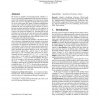511 search results - page 40 / 103 » Analysis of Multi-Organization Scheduling Algorithms |
114
click to vote
ECRTS
2010
IEEE
15 years 22 hour ago
2010
IEEE
—In distributed real-time embedded systems (DRE), it is common to model an application as a set of task chains. Each chain is activated cyclically and must complete before an end...
INFOCOM
2007
IEEE
15 years 6 months ago
2007
IEEE
— A good crossbar switch scheduler should be able to achieve 100% throughput and maintain fairness among competing flows. A pure input-queued (IQ) non-buffered switch requires a...
CODES
2009
IEEE
15 years 6 months ago
2009
IEEE
– There has been a recent shift in design paradigms, with many turning towards yield-driven approaches to synthesize and design systems. A major cause of this shift is the contin...
101
click to vote
JSSPP
2009
Springer
15 years 6 months ago
2009
Springer
Abstract. As multi-core processors proliferate, it has become more important than ever to ensure efficient execution of parallel jobs on multiprocessor systems. In this paper, we s...
100
click to vote
TOCS
2008
14 years 11 months ago
2008
We present an adaptive work-stealing thread scheduler, ASTEAL, for fork-join multithreaded jobs, like those written using the Cilk multithreaded language or the Hood work-stealing...



